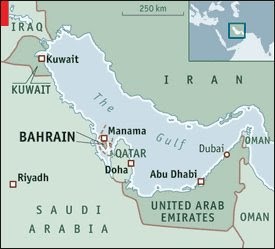 Article follows my comments;
Article follows my comments;
This article is worth reading in the light of how governments get toppled violently. It is the tragedy of the humanity, where the rulers gets arrogant and believe that the minority is subservient to them, because they know it better.
Peace talks fall flat in the face of injustice which ensures non-sustainability of a government, people will bear it and bear it, but deep in their heart there is a spark that craves for justice, and each incident accumulates and catches fire to the point that, it is difficult to reverse the idea of getting even when they get their turn.
This arrogance is not a characteristic of Bahraini rulers alone, it is with the Republicans, Neocons, Islamists, Hindutva, Zionists and other extremists groups.
I hope the Bahraini rulers wake up and take care of the disadvantaged ones before it is too late. Stability of a government is directly dependent on its ability to ensure justice for one and all.
Mike Ghouse
iiiiiiiiiiiiiiiiiiiiiiii
Not so sunny for Shias
Apr 3rd 2008 MANAMA, BAHRAIN
From The Economist print edition
A put-upon majority feels done down—and is getting angry
THE monarchy of Bahrain regards itself as a beacon of democracy in the Middle East. It was the first in the Gulf to give all its citizens the vote, setting up a partially elected parliament, albeit with limited powers, in 2002. Yet in the past few months its officials concede that in an average week there have been more than two riots and five public protests.
Most of the unrest takes place outside the predominantly Sunni capital, Manama, in poorer, mostly Shia, villages. No official statistics are published but some villagers say that a third or even half of them have no jobs. Bahrainis are readier to work in menial jobs than their wealthier counterparts in Kuwait or the United Arab Emirates but cheap foreign workers depress wages. A typical foreign construction worker is housed in a labour camp, cannot bring his family to Bahrain and earns around $160 a month, which would barely support a Bahraini family with four or five children.
The soaring price of land is another grumbling point. Some Bahrainis have been waiting for state housing since 1992. Mortgages are hard to get. Yet the government has embarked on a grandiose campaign to reclaim land, with banks pouring cash into construction. Many of the new schemes are for fancy flats and artificial islands, like those in Dubai, and are more likely to be sold to rich Saudis or people from the emirates than to Bahrainis.
To make matters worse, these inequalities often have a sectarian tint. Most Bahrainis are Shias but the royal family is Sunni. The Shias are more likely to be jobless; many government employers discriminate in favour of Sunnis. “Recently I went for a public-sector job and they asked me what sect I was,” says a sour Shia mechanic. “But I didn’t come to the garage to pray!”
Ebrahim Sharif, a former banker, heads Wa’ad, a liberal Arab-nationalist party. Himself a Sunni, he thinks Sunni and Shia Bahrainis should form a united opposition. “Most of the Shias are worse off than the average Sunni but the only first-class citizens are the royal family,” he says. However his party lost all its seats in the last election, and the parliament is dominated by Islamists of both sects.
These included the country’s main Shia opposition group, Wefaq National Islamic Society, which joined parliament in 2006 after boycotting the previous election four years earlier. Its presence raised hopes of change. But voters are growing frustrated with parliament as they realise how few powers its elected members have. The government controls the pace of liberalisation. Local political activists get little support from abroad. America is wary of calling for more democracy. It fears that parliamentarians may turn against America’s naval base in Bahrain, its biggest in the Gulf; last year a majority of them declared that it should not be used in any war between America and Iran. More recently the government has signed an agreement with America to help Bahrain develop peaceful nuclear technology.
Wefaq must now deal with one of the trickiest sectarian issues raised by its supporters: a widespread rumour that the government is handing out passports to Sunnis from other countries in an attempt to turn the Shias into a minority. These fears were raised in a report in 2006 by a former government adviser, Salah al-Bandar, who said he had confidential government documents revealing such a plan, The government hotly denies any such thing. The row has flared up again with the publication of government statistics that show the population jumping by 41% last year and the number of citizens growing by 15%, against a previous rate of 2.4%.
Wefaq wants to question a minister named in Mr Bandar’s report. The constitution says a minister must submit to questions in parliament if five of the assembly’s members so demand; in this case, 18 want the minister questioned, so far in vain. The row has paralysed parliament for the past six weeks as debates have descended into shouting matches; for one week it was suspended. A Sunni Islamist member says it should be dissolved. Wefaq is wondering whether it was sensible to have joined it.
This week, just before its officials were to attend a UN meeting to review Bahrain’s human-rights record, the government said it would set up a new human-rights task-force. What a coincidence

